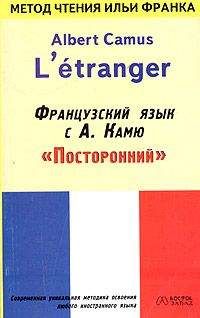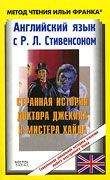Роберт Стивенсон - Английский язык с Р.Л.Стивенсоном. Остров сокровищ
precious [`preʃəs] wiping [`waɪpɪŋ] davy [`deɪvɪ] affair [ə`feə]
“The score!” he burst out. “Three goes o’ rum! Why, shiver my timbers, if I hadn’t forgotten my score!”
And, falling on a bench, he laughed until the tears ran down his cheeks. I could not help joining; and we laughed together, peal after peal, until the tavern rang again.
“Why, what a precious old sea-calf I am!” he said, at last, wiping his cheeks. “You and me should get on well, Hawkins, for I’ll take my davy I should be rated ship’s boy. But, come, now, stand by to go about. This won’t do. Dooty is dooty, messmates. I’ll put on my old cocked hat, and step along of you to Cap’n Trelawney, and report this here affair. For, mind you, it’s serious, young Hawkins; and neither you nor me’s come out of it with what I should make so bold as to call credit. Nor you neither, says you; not smart — none of the pair of us smart. But dash my buttons! That was a good ’un about my score.”
And he began to laugh again, and that so heartily (начал смеяться снова, и так сильно: «сердечно»), that though I did not see the joke as he did (что, хотя я не видел ничего смешного: «не видел шутки, как он видел = в отличие от него»; joke — шутка), I was again obliged to join him in his mirth (я снова был вынужден присоединиться = невольно присоединился к нему в его веселье).
On our little walk along the quays (во время нашей маленькой прогулки вдоль причалов = по набережной), he made himself the most interesting companion (он оказался: «сделал себя» очень увлекательным собеседником), telling me about the different ships that we passed by (рассказывая мне о различных кораблях, мимо которых мы проходили), their rig, tonnage, and nationality (об их оснастке, тоннаже, национальной принадлежности) explaining the work that was going forward (объясняя работу, которая делалась; to go forward — продвигаться, продолжаться; forward — вперед) — how one was discharging (что одно /судно/ разгружается), another taking in cargo (другое — грузят; to take in cargo — брать груз), and a third making ready for sea (а третье подготавливается для /выхода/ в море); and every now and then telling me some little anecdote of ships or seamen (то и дело рассказывая мне маленькие веселые истории о кораблях и моряках; lit = little), or repeating a nautical phrase till I had learned it perfectly (или повторял какое-нибудь морское выражение до тех пор, пока я не запоминал его отлично). I began to see that here was one of the best of possible shipmates (я начал думать, что здесь = передо мной находился один из лучших возможных товарищей по плаванию).
When we got to the inn (когда мы добрались до трактира), the squire and Dr. Livesey was seated together (сквайр и доктор Ливси сидели вместе), finishing a quart of ale with a toast in it (заканчивая кварту эля с тостами; quart — кварта /1,14 л/), before they should go aboard the schooner on a visit of inspection (прежде чем подняться на борт шхуны — с инспекционным визитом = посмотреть работы).
joke [ʤəuk] obliged [ə`blaɪʤd] discharging [dɪs`tʃɑ:ʤɪŋ] nautical [`nɔ:tɪkl]
And he began to laugh again, and that so heartily, that though I did not see the joke as he did, I was again obliged to join him in his mirth.
On our little walk along the quays, he made himself the most interesting companion, telling me about the different ships that we passed by, their rig, tonnage, and nationality explaining the work that was going forward — how one was discharging, another taking in cargo, and a third making ready for sea; and every now and then telling me some little anecdote of ships or seamen, or repeating a nautical phrase till I had learned it perfectly. I began to see that here was one of the best of possible shipmates.
When we got to the inn, the squire and Dr. Livesey was seated together, finishing a quart of ale with a toast in it, before they should go aboard the schooner on a visit of inspection.
Long John told the story from first to last (Долговязый Джон рассказал историю = о том, что случилось, от начала и до конца: «с первого до последнего»), with a great deal of spirit and the most perfect truth (с большим воодушевлением и с самой совершенной правдой). “That was how it were now, weren’t it, Hawkins (вот так все и было, не правда ли, Хокинс)?” he would say, now and again and I could always bear him entirely out (он говорил то и дело, и я мог всегда полностью поддержать его /слова/).
The two gentlemen regretted that Black Dog had got away (оба джентльмена сожалели, что Черный Пес удрал) but we all agreed there was nothing to be done (но соглашались, что ничего нельзя было поделать), and after I had been complimented (и после того как меня похвалили: «я был похвален»), Long John took up his crutch and departed (Долговязый Джон взял свой костыль и отправился к выходу; to depart — отправляться, уезжать, уходить).
“All hands aboard by four this afternoon (команде: «всем рукам» /быть/ на борту к четырем часам сегодня),” shouted the squire, after him (крикнул сквайр ему вдогонку).
“Ay, ay, sir (есть, сэр),” cried the cook, in the passage (крикнул кок /стоя/ в дверях; passage — проход, вход, коридор).
regretted [rɪ`gretɪd] entirely [ɪn`taɪəlɪ] complimented [`kɔmplɪməntɪd] departed [dɪ`pɑ:tɪd]
Long John told the story from first to last, with a great deal of spirit and the most perfect truth. “That was how it were now, weren’t it, Hawkins?” he would say, now and again and I could always bear him entirely out.
The two gentlemen regretted that Black Dog had got away but we all agreed there was nothing to be done, and after I had been complimented, Long John took up his crutch and departed.
“All hands aboard by four this afternoon,” shouted the squire, after him.
“Ay, ay, sir,” cried the cook, in the passage.
“Well, squire,” said Dr Livesey, “I don’t put much faith in your discoveries (я не слишком доверяю: «не вношу много веры» вашим открытиям = суждениям о людях), as a general thing (как правило; general — обычный, главный, основной); but I will say this, John Silver suits me (но я скажу — Джон Сильвер устраивает меня; to suit — устраивать, подходить, соответствовать).”
“The man’s a perfect trump (этот человек — славный малый),” declared the squire (заявил сквайр).
“And now,” added the doctor (добавил доктор), “Jim may come on board with us, may he not (Джим может подняться на борт вместе с нами, не так ли)?”
“To be sure he may (конечно, может),” says squire. “Take your hat, Hawkins, and we’ll see the ship (бери свою шляпу, Хокинс, и мы /пойдем/ посмотрим корабль).”
discovery [dɪs`kʌvərɪ] general [`ʤenəral] declared [dɪ`kleəd]
“Well, squire,” said Dr Livesey, “I don’t put much faith in your discoveries, as a general thing; but I will say this, John Silver suits me.”
“The man’s a perfect trump,” declared the squire.
“And now,” added the doctor, “Jim may come on board with us, may he not?”
“To be sure he may,” says squire. “Take your hat, Hawkins, and we’ll see the ship.”
Chapter IX (глава 9)
Powder and Arms (порох и оружие)
THE Hispaniola lay some way out (Испаньола лежала довольно далеко /от берега/; way — путь, расстояние), and we went under the figureheads and round the sterns of many other ships (и мы прошли /на лодке/ под фигурами на носах кораблей и мимо множества различных кораблей; stern — корма), and their cables sometimes grated underneath our keel (и их канаты иногда скрипели под нашим килем), and sometimes swung above us (а иногда раскачивались над нами; to swing — качать(ся), колебать(ся)). At last, however, we got alongside (наконец, как бы то ни было, мы добрались до судна; alongside — бок о бок, около, вдоль борта), and were met and saluted as we stepped aboard by the mate, Mr. Arrow (и были встречены и поприветствованы, когда ступили на борт, штурманом, мистером Эрроу), a brown old sailor, with earrings in his ears and a squint (загорелым старым моряком, с серьгами в ушах и косоглазием). He and the squire were very thick and friendly (он и сквайр были очень близки и дружны), but I soon observed that things were not the same between Mr. Trelawney and the captain (но я скоро заметил, что дела не были такими же между мистером Трелони и капитаном = но с капитаном сквайр не ладил).




